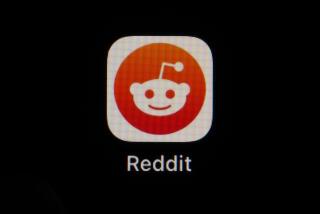Facebook CEO Mark Zuckerberg won’t sell shares for one year

SAN FRANCISCO — With his company’s shares sinking to record lows and concerns about its business growing by the day, Facebook Inc. Chief Executive Mark Zuckerberg is finally breaking his silence.
In a move that analysts said was intended to reassure investors about the young company’s prospects, Facebook said in a regulatory filing Tuesday that Zuckerberg would not sell his Facebook shares for at least one year.
In addition, the reclusive Facebook founder will sit down next week for a rare onstage interview at a technology conference in San Francisco, his first public appearance since his company’s disastrous stock market debut.
Investors have been clamoring to hear Zuckerberg’s take on his company’s challenges and the stock’s collapse, yet he has stayed out of the public eye, even amid calls for his resignation.
Facebook recently dispatched Chief Financial Officer David Ebersman to meet with investment banks. But analysts say the time has come to hear from Zuckerberg.
“If you want to be CEO, you have got to be the CEO,” Wedbush Securities analyst Michael Pachter said. “You have to be in front of people. You have to be accountable.”
Facebook’s market value has been on a downward spiral since the initial public stock offering in May as doubts about how much the Menlo Park, Calif., company is really worth have intensified.
The shares hit a record low Tuesday, falling 33 cents, or 1.8%, to $17.73, less than half their IPO price of $38. They regained ground in after-hours trading when Facebook said it would not sell stock to cover a nearly $2-billion tax bill for stock-based compensation and it would allow some employees to cash in their stock early.
The moves reduce by about 101 million the total shares outstanding. Facebook directors Marc Andreessen and Donald Graham will sell some shares to cover their tax obligations but no additional shares, according to a regulatory filing. Investors were furious last month when Facebook director and early investor Peter Thiel sold most of his Facebook holdings after restrictions on insiders selling shares lifted.
In a filing with the Securities and Exchange Commission, Facebook said Zuckerberg “has no intention to conduct any sale transactions in our securities for at least 12 months.” Zuckerberg sold Facebook stock in the IPO to cover his tax bill. He has about 444 million shares of Class B common stock.
A Facebook spokesman declined to comment.
Facebook stock has been pummeled since August when restrictions on insiders selling shares began to expire. And it may not have hit bottom. Insiders will be able to sell more than 1.4 billion shares over the next three months.
Analysts have heaped even more pressure on Facebook to prove it’s more than an Internet fad and that its moneymaking strategies — particularly on mobile devices — are starting to pay off. Analysts from two of Facebook’s largest underwriters on its IPO cut their price targets Tuesday. The Morgan Stanley and JPMorgan Chase & Co. analysts also reduced their revenue projections.
Scott Devitt, an analyst with Morgan Stanley, Facebook’s lead underwriter, cut his price target for the next 12 months to $32 from $38. He also warned that the shares could fall as low as $17. Doug Anmuth, an analyst with JPMorgan Chase, cut his price target even more drastically, to $30 from $45.
“Facebook’s CEO is learning that there are consequences to providing less than concrete strategies for business growth. In business, clarity provides hope for investors, especially in rapidly moving business segments,” said Michael Yoshikami, CEO of Destination Wealth Management, which does not own Facebook shares. “Facebook needs to provide that clarity or risk further price erosion.”
Crisis management expert Eric Dezenhall said the timing is right for Zuckerberg to go on the offensive.
“Clearly he has to do something, having spent the last few years in flip-flops and a hoodie, pontificating about how Facebook is going to change the world,” Dezenhall said. “I think what people are going to need now is a road map that, among other things, answers the question: What is a reasonable expectation for this company’s future?”
More to Read
Inside the business of entertainment
The Wide Shot brings you news, analysis and insights on everything from streaming wars to production — and what it all means for the future.
You may occasionally receive promotional content from the Los Angeles Times.










